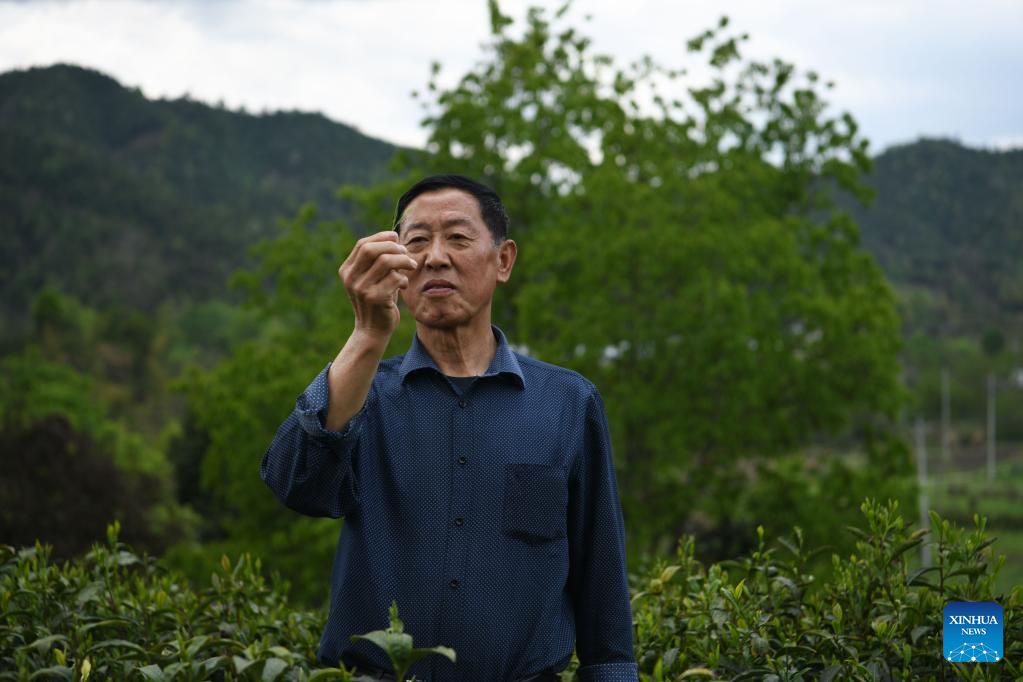
Xie Yongzhong, inheritor of Keemun black tea making skills, checks the growth of tea leaves at a tea garden in Qimen County of Huangshan City, east China's Anhui Province, April 19, 2023. Keemun black tea, which originated in Qimen County of east China's Anhui Province, is one of the most famous Chinese teas featuring an intense aroma. It has a history of more than 100 years.
Xie Yongzhong, a 71-year-old inheritor of Keemun black tea making skills, followed his elders to pick tea leaves on the mountains and learned the basic tea-making skills since childhood.
"I am very interested in processing tea. Even if I am tired, as long as I see the tea and the sieve, I feel very happy," Xie said.
Xie is able to endure hardship and has a high learning ability. He has learned from several tea masters and gradually mastered all seventeen processing steps of Keemun black tea.
"If you want to make good tea, every detail must be conducted seriously," he said.
According to local statistics, tea plantations currently cover an area of about 12,600 hectares in Qimen, producing a comprehensive value of 5.52 billion yuan (about 808.6 million U.S. dollars) in 2022. A total of 7,300 tonnes of tea were produced in the county last year. (Xinhua/Zhang Duan)
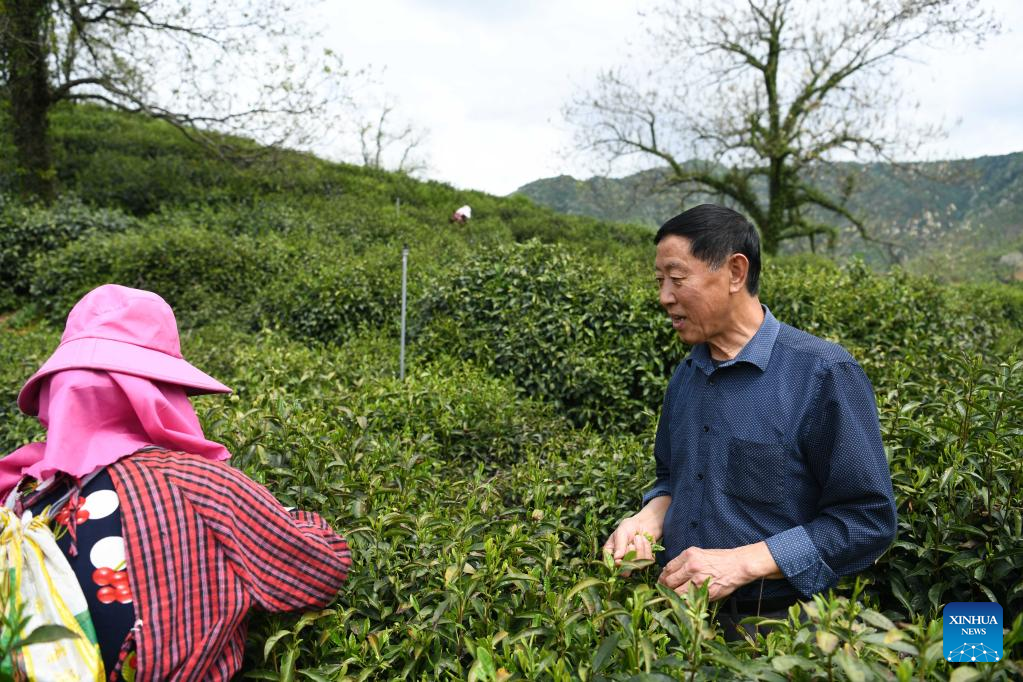
Xie Yongzhong (R), inheritor of Keemun black tea making skills, talks with a tea farmer at a tea garden in Qimen County of Huangshan City, east China's Anhui Province, on April 19, 2023. Keemun black tea, which originated in Qimen County of east China's Anhui Province, is one of the most famous Chinese teas featuring an intense aroma. It has a history of more than 100 years.
Xie Yongzhong, a 71-year-old inheritor of Keemun black tea making skills, followed his elders to pick tea leaves on the mountains and learned the basic tea-making skills since childhood.
"I am very interested in processing tea. Even if I am tired, as long as I see the tea and the sieve, I feel very happy," Xie said.
Xie is able to endure hardship and has a high learning ability. He has learned from several tea masters and gradually mastered all seventeen processing steps of Keemun black tea.
"If you want to make good tea, every detail must be conducted seriously," he said.
According to local statistics, tea plantations currently cover an area of about 12,600 hectares in Qimen, producing a comprehensive value of 5.52 billion yuan (about 808.6 million U.S. dollars) in 2022. A total of 7,300 tonnes of tea were produced in the county last year. (Xinhua/Zhang Duan)
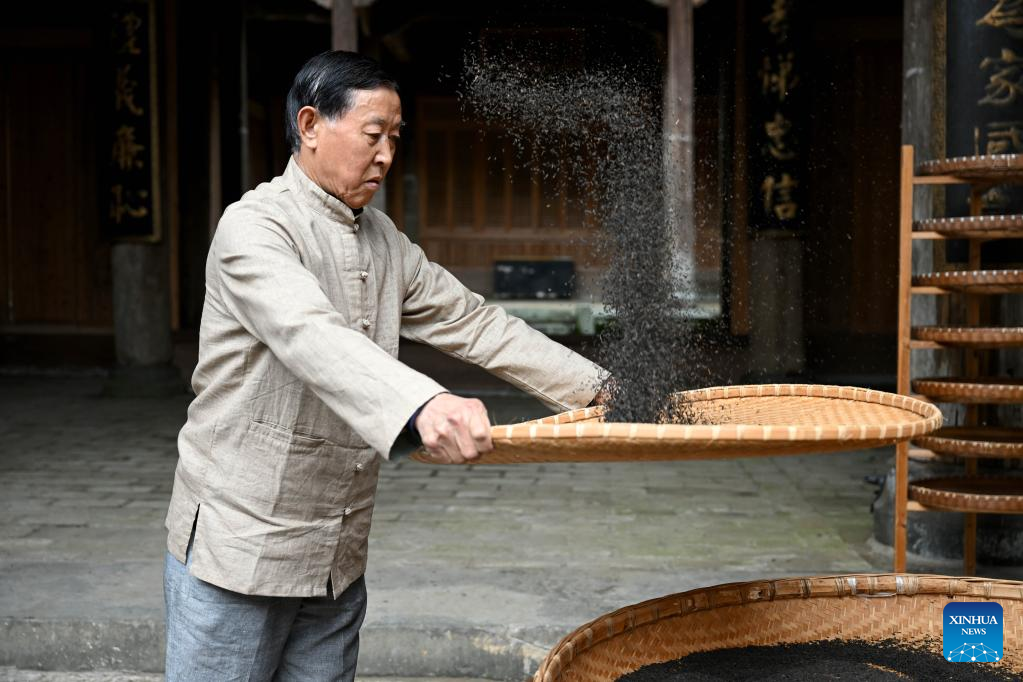
Xie Yongzhong, inheritor of Keemun black tea making skills, processes tea leaves in Qimen County of Huangshan City, east China's Anhui Province, on March 23, 2023. Keemun black tea, which originated in Qimen County of east China's Anhui Province, is one of the most famous Chinese teas featuring an intense aroma. It has a history of more than 100 years.
Xie Yongzhong, a 71-year-old inheritor of Keemun black tea making skills, followed his elders to pick tea leaves on the mountains and learned the basic tea-making skills since childhood.
"I am very interested in processing tea. Even if I am tired, as long as I see the tea and the sieve, I feel very happy," Xie said.
Xie is able to endure hardship and has a high learning ability. He has learned from several tea masters and gradually mastered all seventeen processing steps of Keemun black tea.
"If you want to make good tea, every detail must be conducted seriously," he said.
According to local statistics, tea plantations currently cover an area of about 12,600 hectares in Qimen, producing a comprehensive value of 5.52 billion yuan (about 808.6 million U.S. dollars) in 2022. A total of 7,300 tonnes of tea were produced in the county last year. (Xinhua/Huang Bohan)
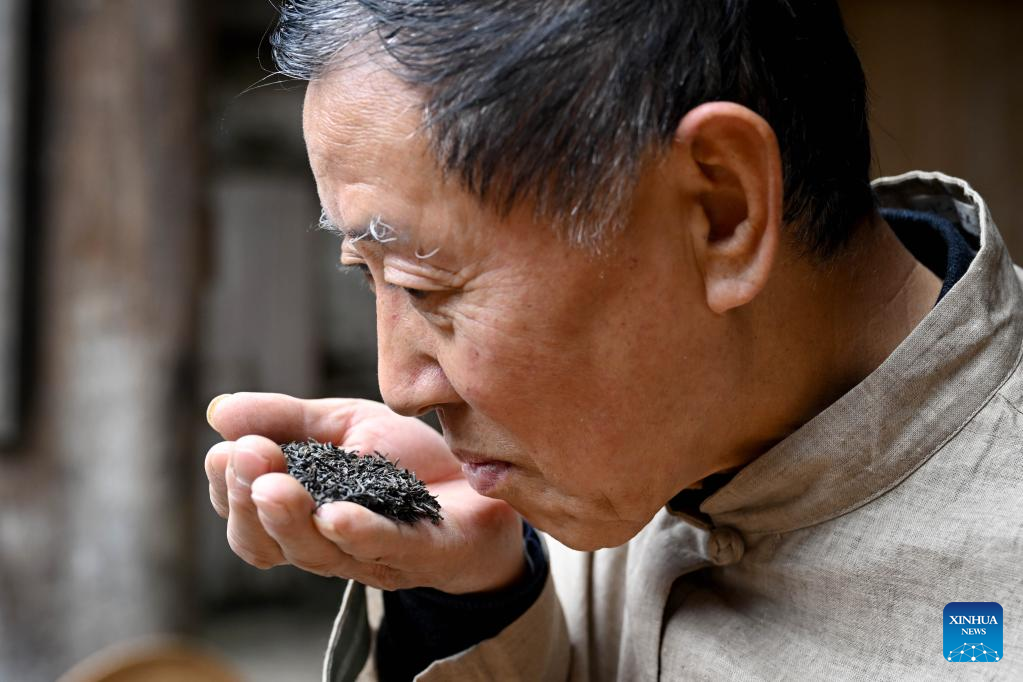
Xie Yongzhong, inheritor of Keemun black tea making skills, smells the fragrance of tea leaves in Qimen County of Huangshan City, east China's Anhui Province, on March 23, 2023. Keemun black tea, which originated in Qimen County of east China's Anhui Province, is one of the most famous Chinese teas featuring an intense aroma. It has a history of more than 100 years.
Xie Yongzhong, a 71-year-old inheritor of Keemun black tea making skills, followed his elders to pick tea leaves on the mountains and learned the basic tea-making skills since childhood.
"I am very interested in processing tea. Even if I am tired, as long as I see the tea and the sieve, I feel very happy," Xie said.
Xie is able to endure hardship and has a high learning ability. He has learned from several tea masters and gradually mastered all seventeen processing steps of Keemun black tea.
"If you want to make good tea, every detail must be conducted seriously," he said.
According to local statistics, tea plantations currently cover an area of about 12,600 hectares in Qimen, producing a comprehensive value of 5.52 billion yuan (about 808.6 million U.S. dollars) in 2022. A total of 7,300 tonnes of tea were produced in the county last year. (Xinhua/Huang Bohan)
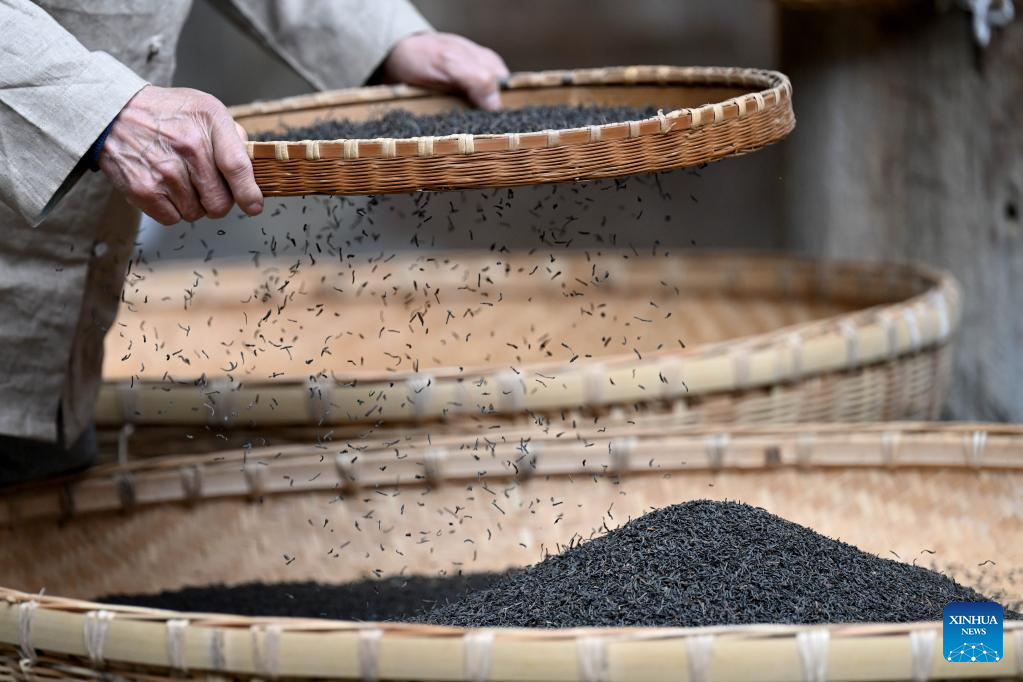
Xie Yongzhong, inheritor of Keemun black tea making skills, processes tea leaves in Qimen County of Huangshan City, east China's Anhui Province, on March 23, 2023. Keemun black tea, which originated in Qimen County of east China's Anhui Province, is one of the most famous Chinese teas featuring an intense aroma. It has a history of more than 100 years.
Xie Yongzhong, a 71-year-old inheritor of Keemun black tea making skills, followed his elders to pick tea leaves on the mountains and learned the basic tea-making skills since childhood.
"I am very interested in processing tea. Even if I am tired, as long as I see the tea and the sieve, I feel very happy," Xie said.
Xie is able to endure hardship and has a high learning ability. He has learned from several tea masters and gradually mastered all seventeen processing steps of Keemun black tea.
"If you want to make good tea, every detail must be conducted seriously," he said.
According to local statistics, tea plantations currently cover an area of about 12,600 hectares in Qimen, producing a comprehensive value of 5.52 billion yuan (about 808.6 million U.S. dollars) in 2022. A total of 7,300 tonnes of tea were produced in the county last year. (Xinhua/Huang Bohan)
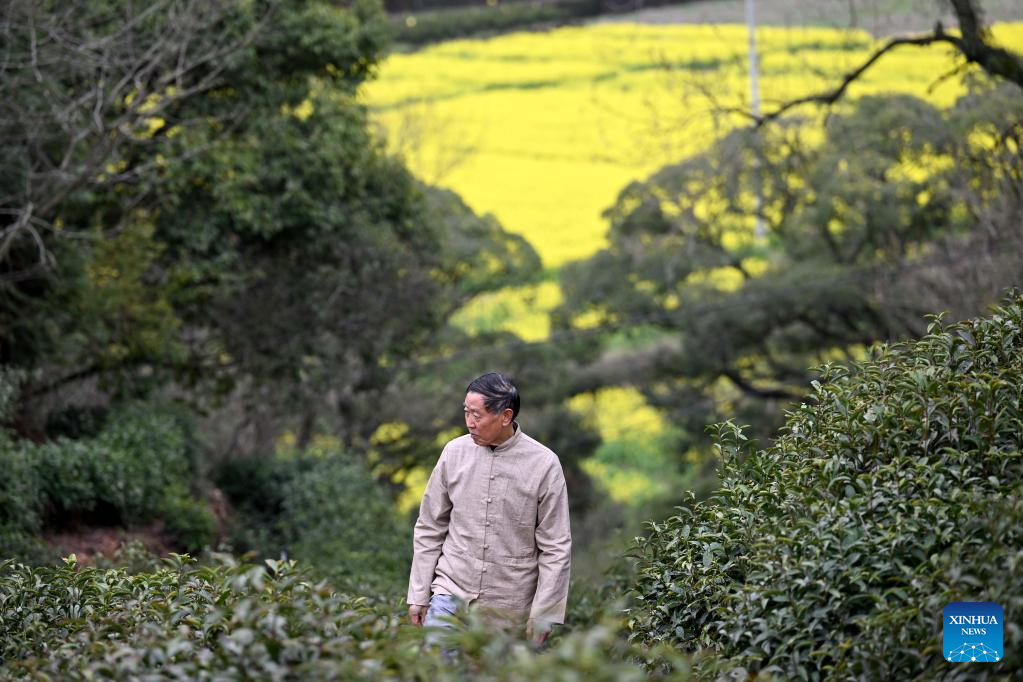
Xie Yongzhong, inheritor of Keemun black tea making skills, checks the growth of tea leaves at a tea garden in Qimen County of Huangshan City, east China's Anhui Province, on March 23, 2023. Keemun black tea, which originated in Qimen County of east China's Anhui Province, is one of the most famous Chinese teas featuring an intense aroma. It has a history of more than 100 years.
Xie Yongzhong, a 71-year-old inheritor of Keemun black tea making skills, followed his elders to pick tea leaves on the mountains and learned the basic tea-making skills since childhood.
"I am very interested in processing tea. Even if I am tired, as long as I see the tea and the sieve, I feel very happy," Xie said.
Xie is able to endure hardship and has a high learning ability. He has learned from several tea masters and gradually mastered all seventeen processing steps of Keemun black tea.
"If you want to make good tea, every detail must be conducted seriously," he said.
According to local statistics, tea plantations currently cover an area of about 12,600 hectares in Qimen, producing a comprehensive value of 5.52 billion yuan (about 808.6 million U.S. dollars) in 2022. A total of 7,300 tonnes of tea were produced in the county last year. (Xinhua/Huang Bohan)
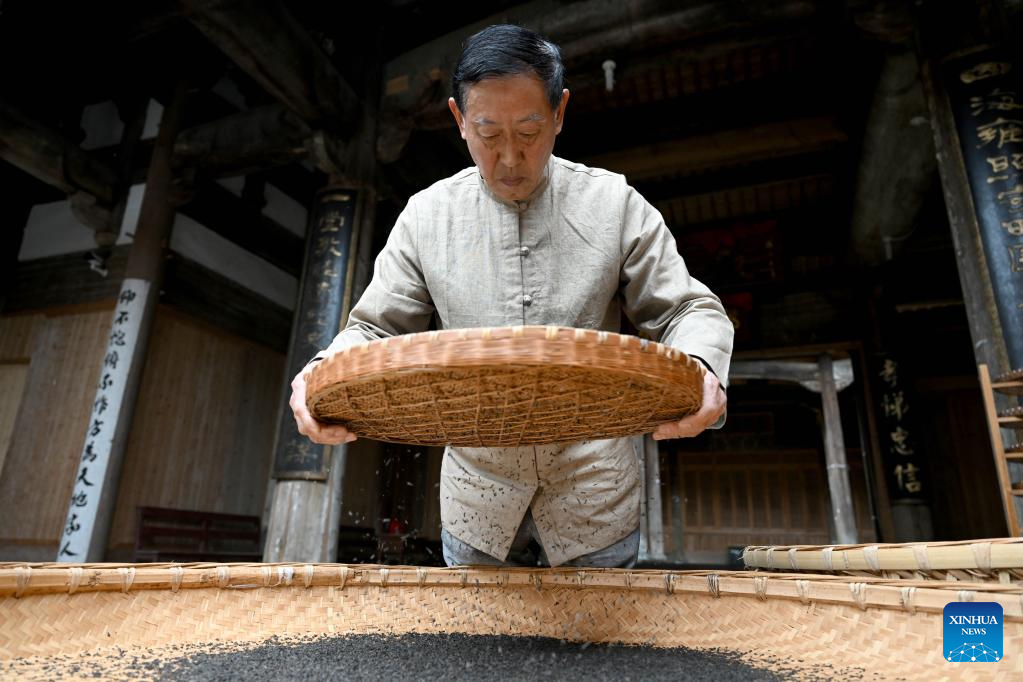
Xie Yongzhong, inheritor of Keemun black tea making skills, processes tea leaves in Qimen County of Huangshan City, east China's Anhui Province, on March 23, 2023. Keemun black tea, which originated in Qimen County of east China's Anhui Province, is one of the most famous Chinese teas featuring an intense aroma. It has a history of more than 100 years.
Xie Yongzhong, a 71-year-old inheritor of Keemun black tea making skills, followed his elders to pick tea leaves on the mountains and learned the basic tea-making skills since childhood.
"I am very interested in processing tea. Even if I am tired, as long as I see the tea and the sieve, I feel very happy," Xie said.
Xie is able to endure hardship and has a high learning ability. He has learned from several tea masters and gradually mastered all seventeen processing steps of Keemun black tea.
"If you want to make good tea, every detail must be conducted seriously," he said.
According to local statistics, tea plantations currently cover an area of about 12,600 hectares in Qimen, producing a comprehensive value of 5.52 billion yuan (about 808.6 million U.S. dollars) in 2022. A total of 7,300 tonnes of tea were produced in the county last year. (Xinhua/Huang Bohan)
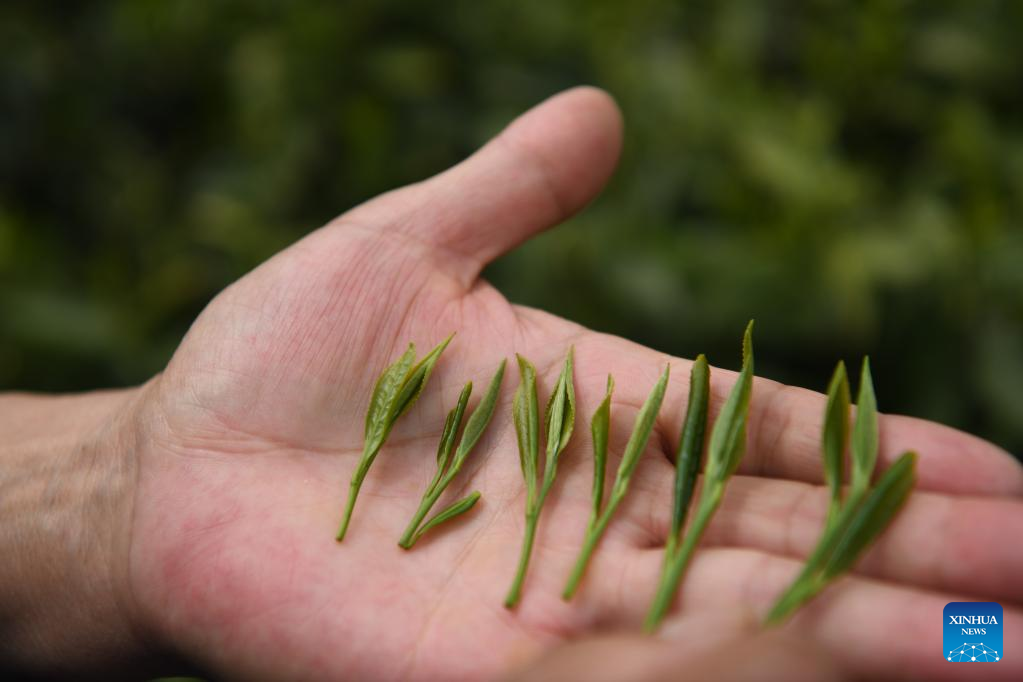
Xie Yongzhong, inheritor of Keemun black tea making skills, shows tea leaves for making Keemun black tea in Qimen County of Huangshan City, east China's Anhui Province, on April 19, 2023. Keemun black tea, which originated in Qimen County of east China's Anhui Province, is one of the most famous Chinese teas featuring an intense aroma. It has a history of more than 100 years.
Xie Yongzhong, a 71-year-old inheritor of Keemun black tea making skills, followed his elders to pick tea leaves on the mountains and learned the basic tea-making skills since childhood.
"I am very interested in processing tea. Even if I am tired, as long as I see the tea and the sieve, I feel very happy," Xie said.
Xie is able to endure hardship and has a high learning ability. He has learned from several tea masters and gradually mastered all seventeen processing steps of Keemun black tea.
"If you want to make good tea, every detail must be conducted seriously," he said.
According to local statistics, tea plantations currently cover an area of about 12,600 hectares in Qimen, producing a comprehensive value of 5.52 billion yuan (about 808.6 million U.S. dollars) in 2022. A total of 7,300 tonnes of tea were produced in the county last year. (Xinhua/Zhang Duan)
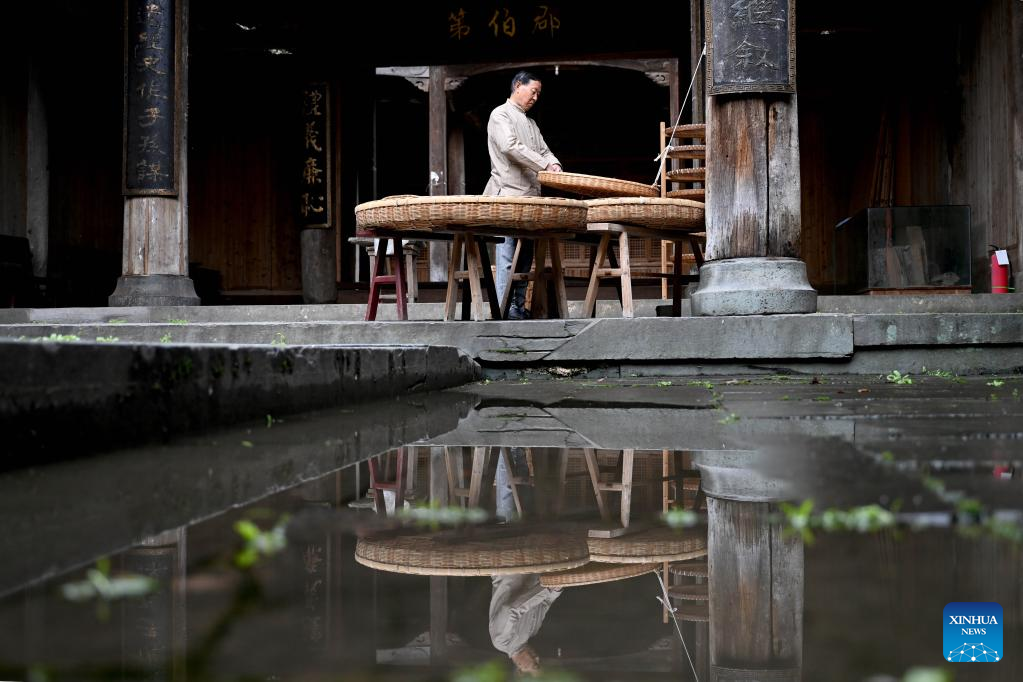
Xie Yongzhong, inheritor of Keemun black tea making skills, processes tea leaves in Qimen County of Huangshan City, east China's Anhui Province, on March 23, 2023. Keemun black tea, which originated in Qimen County of east China's Anhui Province, is one of the most famous Chinese teas featuring an intense aroma. It has a history of more than 100 years.
Xie Yongzhong, a 71-year-old inheritor of Keemun black tea making skills, followed his elders to pick tea leaves on the mountains and learned the basic tea-making skills since childhood.
"I am very interested in processing tea. Even if I am tired, as long as I see the tea and the sieve, I feel very happy," Xie said.
Xie is able to endure hardship and has a high learning ability. He has learned from several tea masters and gradually mastered all seventeen processing steps of Keemun black tea.
"If you want to make good tea, every detail must be conducted seriously," he said.
According to local statistics, tea plantations currently cover an area of about 12,600 hectares in Qimen, producing a comprehensive value of 5.52 billion yuan (about 808.6 million U.S. dollars) in 2022. A total of 7,300 tonnes of tea were produced in the county last year. (Xinhua/Huang Bohan)
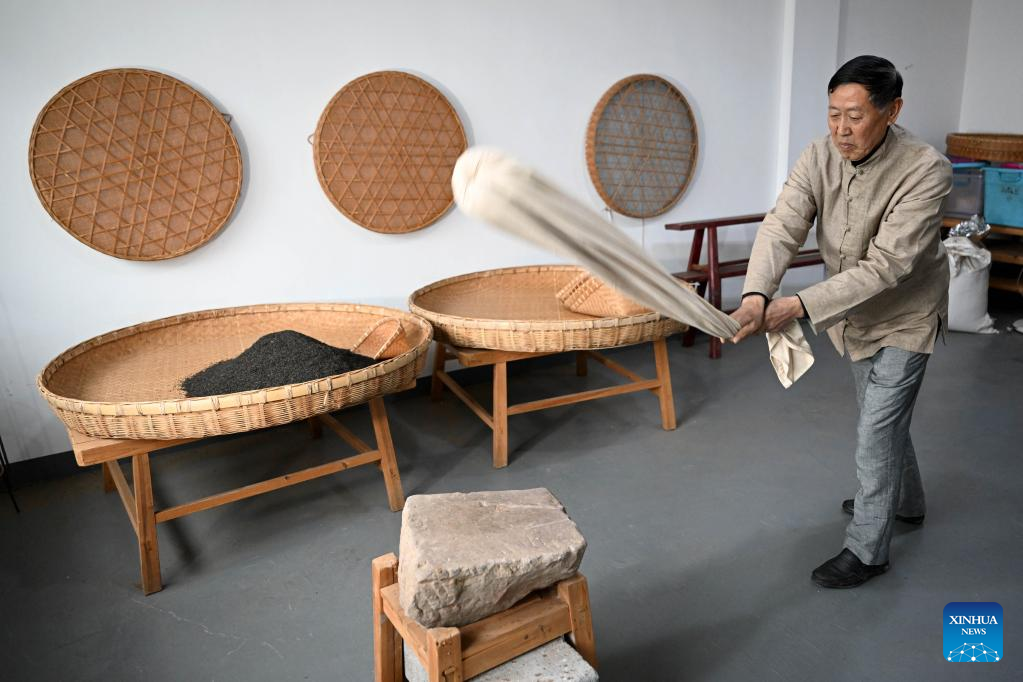
Xie Yongzhong, inheritor of Keemun black tea making skills, processes tea leaves in Qimen County of Huangshan City, east China's Anhui Province, on March 23, 2023. Keemun black tea, which originated in Qimen County of east China's Anhui Province, is one of the most famous Chinese teas featuring an intense aroma. It has a history of more than 100 years.
Xie Yongzhong, a 71-year-old inheritor of Keemun black tea making skills, followed his elders to pick tea leaves on the mountains and learned the basic tea-making skills since childhood.
"I am very interested in processing tea. Even if I am tired, as long as I see the tea and the sieve, I feel very happy," Xie said.
Xie is able to endure hardship and has a high learning ability. He has learned from several tea masters and gradually mastered all seventeen processing steps of Keemun black tea.
"If you want to make good tea, every detail must be conducted seriously," he said.
According to local statistics, tea plantations currently cover an area of about 12,600 hectares in Qimen, producing a comprehensive value of 5.52 billion yuan (about 808.6 million U.S. dollars) in 2022. A total of 7,300 tonnes of tea were produced in the county last year. (Xinhua/Huang Bohan)
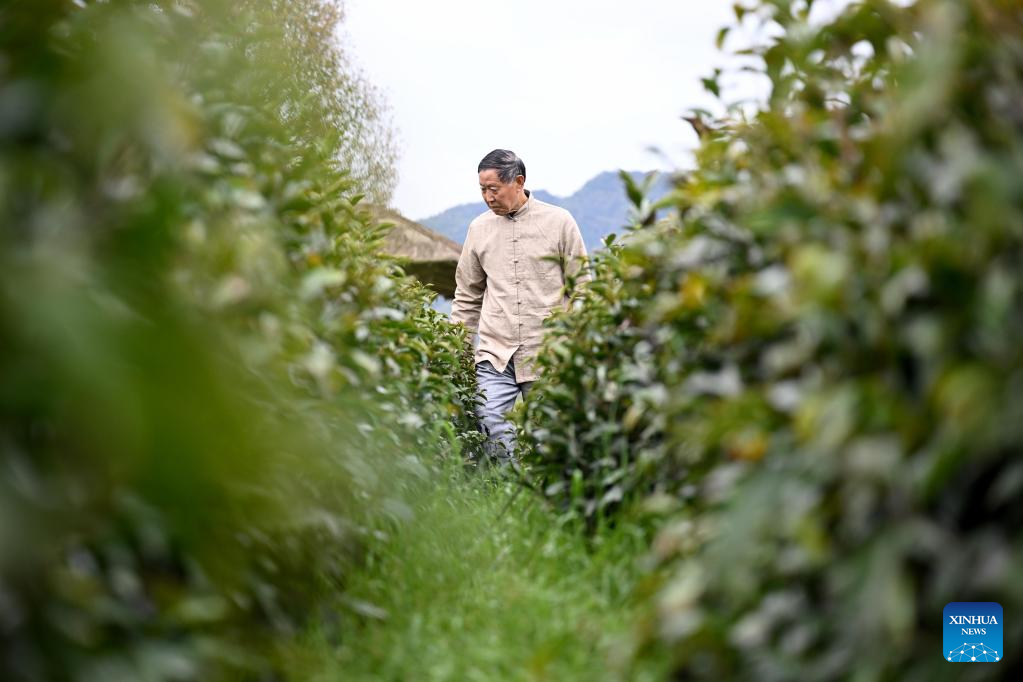
Xie Yongzhong, inheritor of Keemun black tea making skills, checks the growth of tea leaves at a tea garden in Qimen County of Huangshan City, east China's Anhui Province, on March 23, 2023. Keemun black tea, which originated in Qimen County of east China's Anhui Province, is one of the most famous Chinese teas featuring an intense aroma. It has a history of more than 100 years.
Xie Yongzhong, a 71-year-old inheritor of Keemun black tea making skills, followed his elders to pick tea leaves on the mountains and learned the basic tea-making skills since childhood.
"I am very interested in processing tea. Even if I am tired, as long as I see the tea and the sieve, I feel very happy," Xie said.
Xie is able to endure hardship and has a high learning ability. He has learned from several tea masters and gradually mastered all seventeen processing steps of Keemun black tea.
"If you want to make good tea, every detail must be conducted seriously," he said.
According to local statistics, tea plantations currently cover an area of about 12,600 hectares in Qimen, producing a comprehensive value of 5.52 billion yuan (about 808.6 million U.S. dollars) in 2022. A total of 7,300 tonnes of tea were produced in the county last year. (Xinhua/Huang Bohan)
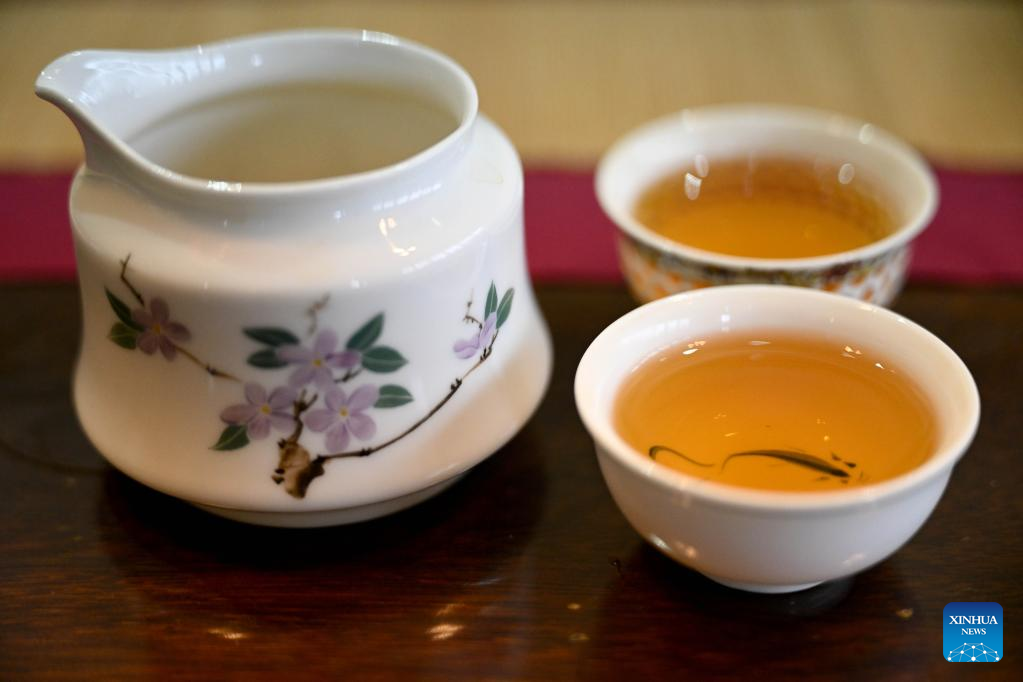
This photo taken on March 23, 2023 shows cups of Keemun black tea in Qimen County of Huangshan City, east China's Anhui Province. Keemun black tea, which originated in Qimen County of east China's Anhui Province, is one of the most famous Chinese teas featuring an intense aroma. It has a history of more than 100 years.
Xie Yongzhong, a 71-year-old inheritor of Keemun black tea making skills, followed his elders to pick tea leaves on the mountains and learned the basic tea-making skills since childhood.
"I am very interested in processing tea. Even if I am tired, as long as I see the tea and the sieve, I feel very happy," Xie said.
Xie is able to endure hardship and has a high learning ability. He has learned from several tea masters and gradually mastered all seventeen processing steps of Keemun black tea.
"If you want to make good tea, every detail must be conducted seriously," he said.
According to local statistics, tea plantations currently cover an area of about 12,600 hectares in Qimen, producing a comprehensive value of 5.52 billion yuan (about 808.6 million U.S. dollars) in 2022. A total of 7,300 tonnes of tea were produced in the county last year. (Xinhua/Huang Bohan)
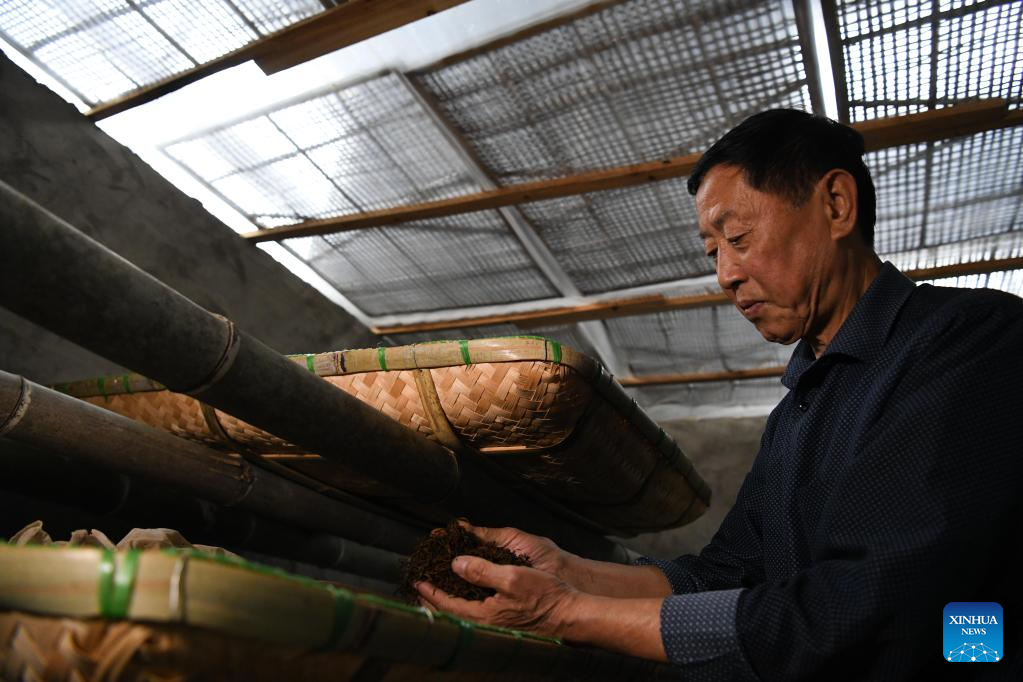
Xie Yongzhong, inheritor of Keemun black tea making skills, checks the fermentation of tea leaves in Qimen County of Huangshan City, east China's Anhui Province, April 19, 2023. Keemun black tea, which originated in Qimen County of east China's Anhui Province, is one of the most famous Chinese teas featuring an intense aroma. It has a history of more than 100 years.
Xie Yongzhong, a 71-year-old inheritor of Keemun black tea making skills, followed his elders to pick tea leaves on the mountains and learned the basic tea-making skills since childhood.
"I am very interested in processing tea. Even if I am tired, as long as I see the tea and the sieve, I feel very happy," Xie said.
Xie is able to endure hardship and has a high learning ability. He has learned from several tea masters and gradually mastered all seventeen processing steps of Keemun black tea.
"If you want to make good tea, every detail must be conducted seriously," he said.
According to local statistics, tea plantations currently cover an area of about 12,600 hectares in Qimen, producing a comprehensive value of 5.52 billion yuan (about 808.6 million U.S. dollars) in 2022. A total of 7,300 tonnes of tea were produced in the county last year. (Xinhua/Zhang Duan)
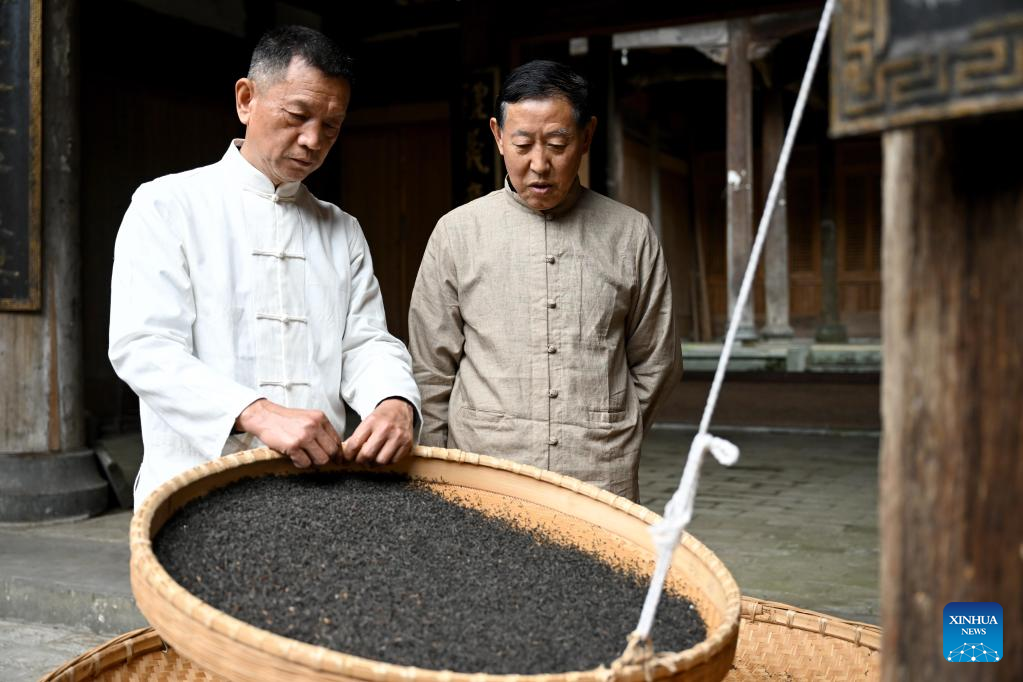
Xie Yongzhong (R), inheritor of Keemun black tea making skills, instructs apprentice Hu Yichun to process tea leaves in Qimen County of Huangshan City, east China's Anhui Province, on March 23, 2023. Keemun black tea, which originated in Qimen County of east China's Anhui Province, is one of the most famous Chinese teas featuring an intense aroma. It has a history of more than 100 years.
Xie Yongzhong, a 71-year-old inheritor of Keemun black tea making skills, followed his elders to pick tea leaves on the mountains and learned the basic tea-making skills since childhood.
"I am very interested in processing tea. Even if I am tired, as long as I see the tea and the sieve, I feel very happy," Xie said.
Xie is able to endure hardship and has a high learning ability. He has learned from several tea masters and gradually mastered all seventeen processing steps of Keemun black tea.
"If you want to make good tea, every detail must be conducted seriously," he said.
According to local statistics, tea plantations currently cover an area of about 12,600 hectares in Qimen, producing a comprehensive value of 5.52 billion yuan (about 808.6 million U.S. dollars) in 2022. A total of 7,300 tonnes of tea were produced in the county last year. (Xinhua/Huang Bohan)
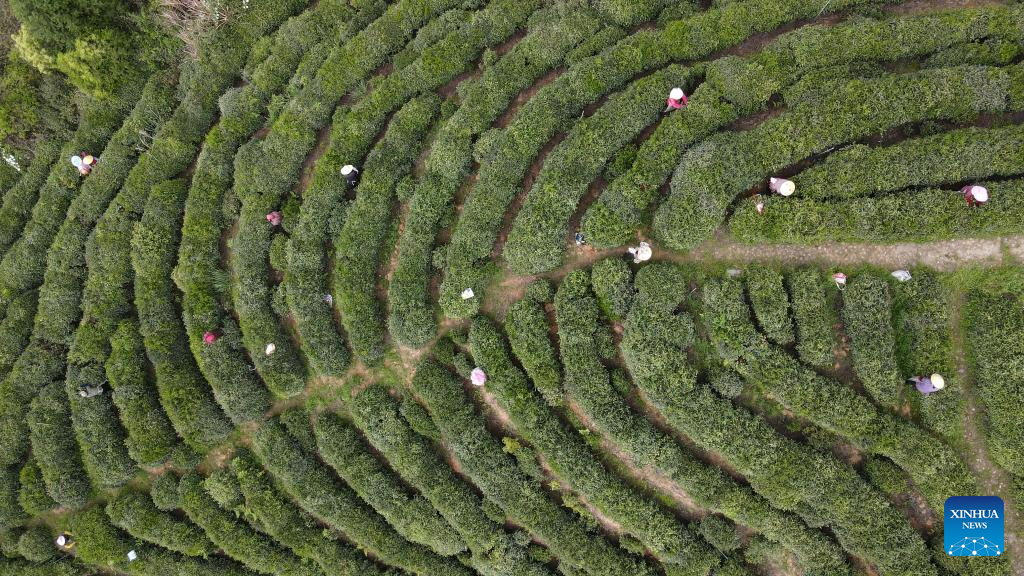
This aerial photo taken on April 19, 2023 shows farmers picking tea leaves at a tea garden in Qimen County of Huangshan City, east China's Anhui Province. Keemun black tea, which originated in Qimen County of east China's Anhui Province, is one of the most famous Chinese teas featuring an intense aroma. It has a history of more than 100 years.
Xie Yongzhong, a 71-year-old inheritor of Keemun black tea making skills, followed his elders to pick tea leaves on the mountains and learned the basic tea-making skills since childhood.
"I am very interested in processing tea. Even if I am tired, as long as I see the tea and the sieve, I feel very happy," Xie said.
Xie is able to endure hardship and has a high learning ability. He has learned from several tea masters and gradually mastered all seventeen processing steps of Keemun black tea.
"If you want to make good tea, every detail must be conducted seriously," he said.
According to local statistics, tea plantations currently cover an area of about 12,600 hectares in Qimen, producing a comprehensive value of 5.52 billion yuan (about 808.6 million U.S. dollars) in 2022. A total of 7,300 tonnes of tea were produced in the county last year. (Xinhua/Zhang Duan)
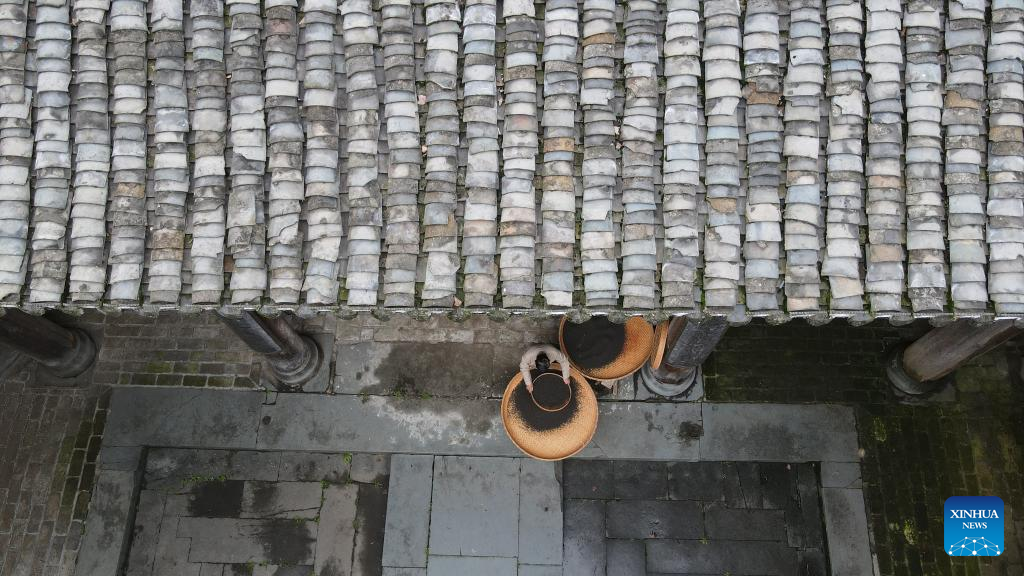
This aerial photo taken on March 23, 2023 shows Xie Yongzhong, inheritor of Keemun black tea making skills, making Keemun black tea in Qimen County of Huangshan City, east China's Anhui Province. Keemun black tea, which originated in Qimen County of east China's Anhui Province, is one of the most famous Chinese teas featuring an intense aroma. It has a history of more than 100 years.
Xie Yongzhong, a 71-year-old inheritor of Keemun black tea making skills, followed his elders to pick tea leaves on the mountains and learned the basic tea-making skills since childhood.
"I am very interested in processing tea. Even if I am tired, as long as I see the tea and the sieve, I feel very happy," Xie said.
Xie is able to endure hardship and has a high learning ability. He has learned from several tea masters and gradually mastered all seventeen processing steps of Keemun black tea.
"If you want to make good tea, every detail must be conducted seriously," he said.
According to local statistics, tea plantations currently cover an area of about 12,600 hectares in Qimen, producing a comprehensive value of 5.52 billion yuan (about 808.6 million U.S. dollars) in 2022. A total of 7,300 tonnes of tea were produced in the county last year. (Xinhua/Zhang Duan)







